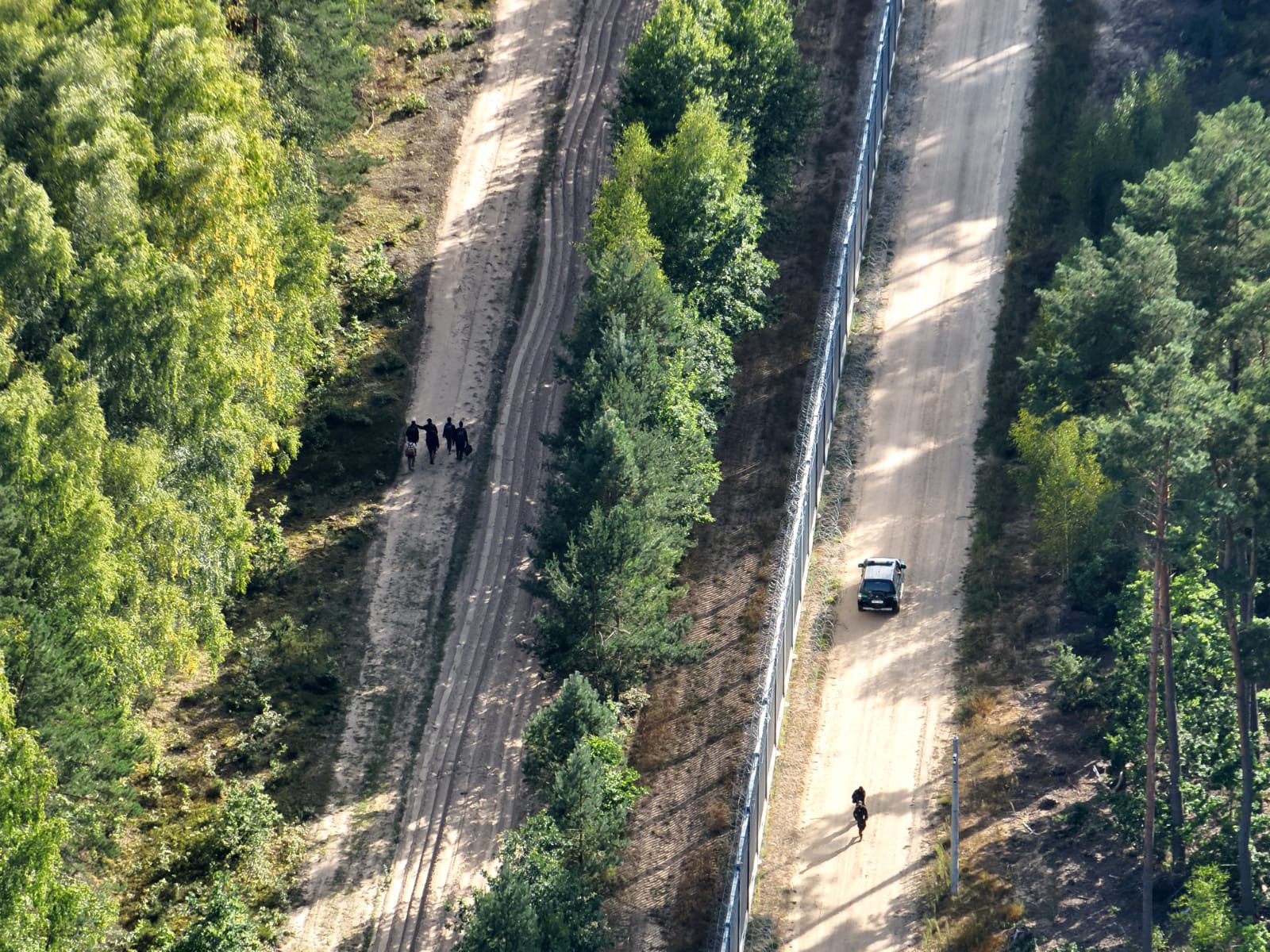Germany´s campaign against Poland´s anti-migrant barrier at Belarusian border

Polish border guards patrolling the border with Belarus. Source: https://twitter.com/Straz_Graniczna
In the run-up to Poland’s parliamentary elections on October 15, the demand to tear down the barrier on the border with Belarus hangs in the air. The intensification of media attacks on the newly-built fence, coupled with broader attacks on Law and Justice’s migration policy, originates partly from the German press.
Tomasz Rowiński
“Tear down the barrier, and give the remnants to Podlasie residents,” Jana Shostak said in a media statement last August. Shostak is a Polish-Belarusian activist, currently running for the Sejm on the Left party’s list. When she uttered those words she was still a candidate for Donald Tusk’s Civic Platform (PO), but she later changed parties after coming out in favor of abortion up to the ninth month of pregnancy.
Although Shostak probably has little chance of entering parliament, the attitude of opposition groups toward her statements raises questions. Wouldn’t the barrier on our northeastern border again become the subject of a dangerous political game for Poland should the opposition come to power in the fall?
At least two opposition groups have clearly stated their position on the issue. Apparently, there is continuity between the behavior of MP Franciszek Sterczewski, who was running along the Polish–Belarusian border in the summer of 2021 claiming he wanted to “rescue” migrants from the Polish Border Guard, or the loud statement of MP Iwona Hartwich on social media (“Let these people into Poland at last! Who they are will be determined later! What do you have the security services for?”), and the PO’s stance today. The Left, which has now taken Shostak onto its electoral lists, cannot deny what it stands for either: The demand to demolish the barrier hangs in the air.
Can a fence solve the problem?
The border barrier is attacked mostly for being ineffective. In June, the vice-chairman of the Civic Coalition (KO, the coalition led by Donald Tusk’s PO, ed.) parliamentary group, Paweł Poncyliusz, said on Polskie Radio, Poland’s public radio broadcaster, that “every now and then refugees are found in the forest on the Polish side, not only by the Border Guard, but also by aid organizations that operate in the area.” And he added: “This means that this barrier, even if it cost over a billion zlotys (over 215 million euros, ed.), continues to be ineffective.”
#zgranicy
Cudzoziemcy cały czas są ściągani pod granicę🇵🇱przez służby🇧🇾, które próbują utworzyć szlak nielegalnej migracji przez🇵🇱-to intratny biznes dla reżimu🇧🇾#FunkcjonariuszeSG dzięki #perymetria mają informacje o wszystkich próbach,mogą szybko i skutecznie reagować💪 pic.twitter.com/JOuPoMLt5l— Straż Graniczna (@Straz_Graniczna) August 26, 2023
The impression one gets from reading the various scattered statements made by politicians from the main opposition party on the barrier issue is quite unequivocal. Donald Tusk’s people promote and perpetuate in Polish society the belief that the entire investment is completely senseless.
But if you look at the concrete facts, it is hard not to see how misguided these assertions are. The barrier only extends 187 kilometers, while the entire border between Poland and Belarus is 418 kilometers long. Setting the barrier and the services operating there the unrealistic task of making the border completely impermeable in no way helps to secure it, but serves to dismantle the project politically.
Does the opposition mean Poland should be surrounded with a “tight wall?” Of course not. The barrier on the border with Belarus was scaled for other purposes. In the first place, it has political significance, making it more difficult in a real sense for the Belarusian services to plan a repeat of the summer 2021 hybrid attack on the Polish border. At that time, the real threat was the encroachment onto Polish territory of uncontrolled large groups of aggressive migrants.
However, while the barrier is supporting the work of the Polish services patrolling the eastern border, illegal immigrants heading primarily to Germany are also infiltrating Poland from other countries, including Schengen countries. The case of the detention in Katowice of a bus carrying 18 illegal migrants, reported recently in the media, is just one example of how migrants enter Poland from the south as well. Are we also to put up a fence on the border with Slovakia? In that specific case the bus was driven by two Ukrainian smugglers, but it should be remembered that smuggling gangs are decidedly international.
Attacks coming from Germany
The intensification of media attacks on the barrier, coupled with broader attacks on Law and Justice’s migration policy, originates partly from the German press. This is not to say, of course, that there is nothing to criticize in the policies of Law and Justice (PiS), but in certain respects these attacks suit very well at least some of the German political elite. “Although the Polish government boasts about the effectiveness of the barrier erected on the Polish–Belarusian border, some 14,000 illegal migrants have recently reached Germany through Poland, which is an absolute record,” Karolina Wigura of the Polish liberal online weekly Kultura Liberalna wrote in Germany’s daily Tageszeitung.
What proportion of these people passed across Poland’s eastern border, and what proportion entered the Schengen area elsewhere and then merely moved westward using our highways? How many more people would have ended up in Germany had not Poles been doing their job of catching, among the million white vans traveling on their roads, those that happened to be carrying migrants?

Simply put, people who have sometimes passed through many countries on their route indicate to the German authorities the last one they passed, not the one on whose border they entered the Schengen area. Besides, the illegal immigrants coming to Europe do not necessarily know our continent’s political geography very well. An example of this is a caption purporting to identify the location in one of the recently circulating videos shared by migrants: “Bulgaria, Belgrade.” And even when they intentionally try to confuse the authorities, immigrants may find it very convenient to point to Poland as the country from which they came.
In the German daily Die Welt, migration expert Philip Ther has described Poland’s migration policy as “hypocritical and short-sighted.” That might be the case, but that is not what is really upsetting Germans, who are having increasing problems with the masses of illegal migrants entering their country. In his analysis, relayed to the Polish reader by the editors of “the German voice in the Polish home,” Deutsche Welle, Ther criticizes the fact that Poland welcomes labor migrants. In his opinion, this must end very badly.
This is a debatable matter, but what the German columnist is really getting at, we learn a paragraph later. “Only a liberal government in Poland could convince Poles that Muslims are permanently needed in the country. Such a government could appeal to historical experience. Poland was one of the few countries that managed to integrate Muslims in the early modern era. Neither the Habsburgs nor Tsarist Russia succeeded in this,” we can read in an article titled “Migration problems. Possible breakup of the Schengen area,” published on interia.pl in cooperation with Dw.com, Deutsche Welle’s news site.
But let us not be fooled by sweet words. The issue is not about legal and labor migrants. The Germans do not like the Polish way of doing things to the extent that it affects them. Those caught at the border are pushed back to the Belarusian side as Lukashenko’s lost tourists, and those who make it through go westward and usually do not stay in Poland either.
In many respects, however, the rather consistent policy of the Polish government when it comes to illegal immigration must cause irritation especially among regional-level German politicians in the individual Länder. It is they who are responsible for taking care of the immigrants. Meanwhile, for months there has been talk in Germany of problems with premises, funding, and procedures. The German system for receiving illegal immigrants is simply becoming inefficient. Forcing Poland to keep illegal immigrants in migrant camps set up on its territory would be an ideal solution for the Germans.

Soft power organizations
Hence the pressure on Poland from organizations promoting human rights. So-called human rights and environmentalism are two wings of German soft power. Getting Poland to change its ways would relieve the pressure on the German system, as well as weakening Poland internally. This is where voices like Karolina Wigura’s come from, resonating with German interests. “Burying your head in the sand, as in Poland or other countries, can only be done up to a certain limit. If politicians do not find wise and long-term solutions, it is likely that the Schengen area will fall apart within a few years,” Wigura wrote in Die Tageszeitung. The “wise and long-term” policy is, of course, to support Germany in the trouble it brought on itself by inviting all the world’s migrants in the middle of the last decade.
Meanwhile, migration pressure, most likely stimulated by Moscow and Minsk, is growing. The Border Guard recorded 18,000 attempts to cross the Polish–Belarusian border in the first seven months of this year alone, compared to just under 16,000 in all of 2022. It is clear that for Moscow, boosting migration to the EU is a cheap way to soften up European nations and governments and discourage them from getting too much involved in its war with Ukraine. Generating internal problems in countries considered hostile is a basic principle in the art of war.
In Germany, as many as 175,000 people applied for asylum between January and July this year. This is almost 80 percent more than last year. Incidentally, it is worth noting what percentage of the migration problem in Germany comes from those who get there via Poland. Provided, of course, we consider that the information about the 14,000 migrants from Poland is at all credible.
Support for the anti-immigration AfD party is rising. Its poll ratings now stand at over 20 percent, pushing the ruling SPD into third place. Inevitably, tensions in German politics will grow and will seep into international politics. Indeed this is nothing new, as the Germans are always keen to export their problems.
This article was published in Polish in the Do Rzeczy weekly in September 2023.



